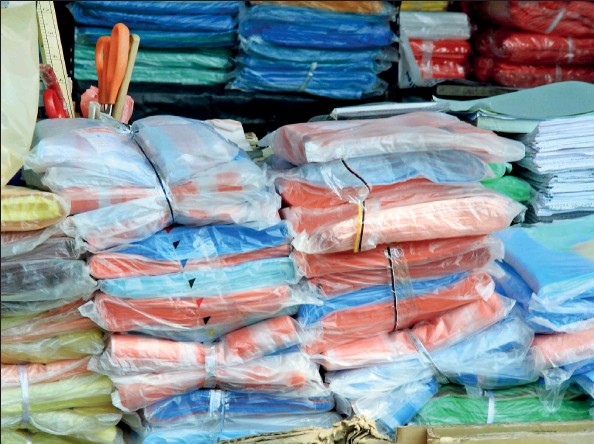
Polythene baddies hammered from tomorrow-31 Jan 2016 Sunday Times (Sri Lanka)
By Malaka Rodrigo
Any form of polythene or plastic takes hundreds of years to decay, polluting the environment, but thinner polythene is more evil as it cannot be recycled. Burning it causes the emission of poisonous gases such as dioxin, so such polythene ends up in garbage dumps.
The Central Environment Authority (CEA) will from next month systematically begin raiding the manufacturers and sellers that do not comply with the ban on polythene less than 20 microns in thickness.
Big demand: A shop that sells only ‘sili sili’ bags in Pettah. Pix by Indika Handuwala“In January, we made some raids and those found guilty had been given chance to adjust to alternatives. But from February onwards, we will take legal action against those who do not comply,” a CEA spokesman warned.
The manufacture, sale or use of polythene less than 20 microns in thickness was banned from 2007 under the National Environment Act under the directive of President Maithripala Sirisena while he was the minister of environment but the law has until now not been properly implemented.
The thickness of polythene sheets is measured in microns – a unit resembling 0.001 millimeter. These thinner polythene sheets are mostly used in shopping bags or “sili sili bags”, lunch sheets and other packaging materials.
Any form of polythene or plastic takes hundreds of years to decay, polluting the environment, but thinner polythene is more evil as it cannot be recycled. Burning it causes the emission of poisonous gases such as dioxin, so such polythene ends up in garbage dumps.
Dumped bags clog the drainage system, creating floods. Animals such as cattle also feed on polythene bags found on rubbish heaps and become ill or die.
The water collected in these disposed bags and wrappers can collect rainwater, making breeding grounds for mosquitoes that spread diseases such as dengue. Polythene dumped in waterways finds its way into the ocean, choking and killing marine life.
According to a survey conducted by the Environment Ministry 72 per cent of villagers and 49 per cent of people in urban areas in the Western Province use polythene lunch sheets.
In total, about 500,000 metric tonnes of polythene and plastics are imported into Sri Lanka with 70 per cent of this going into domestic use while 30 per cent is used in export-related industry.
The positive side is that about 40 per cent of the plastics and thicker polythene is being recycled. The CEA currently has six recycling plants in operation and two more awaiting commissioning. About 160 firms involved in plastic recycling are registered with the CEA and this number is expected to increase.
Worryingly, 60 per cent of the plastic and polythene used domestically ends up in garbage.
The authorities hope the ban on thin polythene will be effective. In Bangladesh, which banned the use of polythene bags in early 2000, media reports say polythene is making an illegal comeback.
A change in consumer attitude is key to the success of the strategy. Experts recommend the widespread teaching of the 3R principles: Refuse, Reuse and Recycle. As consumers, we all have the power to refuse a polythene bag when it is not necessary and we can carry reusable bags.



